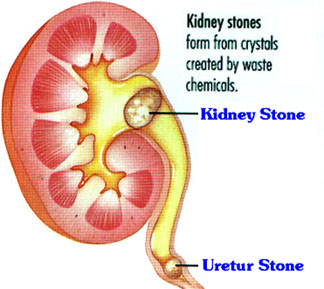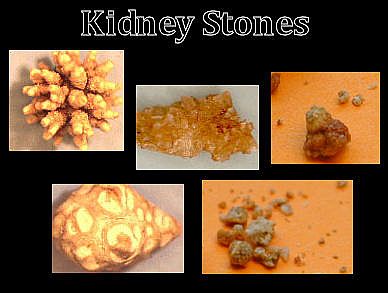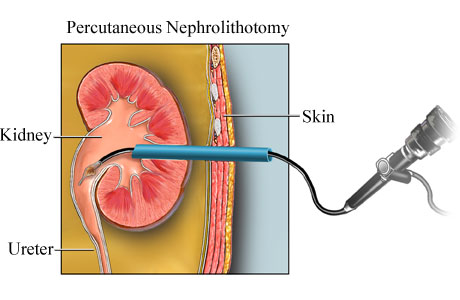
What are kidney stones?
Kidney stones are small pebbles initially and become stones later, after growing in the size. These are formed by crystal aggregation of the dietary mineral present in the urine. They are formed in different locations in the kidney. These might be present in bladder or ureter. These are also classified on the basis of the chemical composition, like having uric acid, struvite or calcium. After the stones are grown more than 3 mm size, they cannot be passed through the urine and start causing the symptom. Mostly men are affected from the kidney stone problems.
The kidney stones lead to dehydration, by developing the body fluids to lose gradually. The acid content in the body will be increased when high protein food is consumed.
Signs and Symptoms
Stones that lodge in the tube that carries urine from the kidneys to the bladder (ureter) results in severe pain that begins in the loin and lower back and radiates to the groin or front of the lower abdomen.
A 'small' stone (usually 4 mm in diameter or less) has a 90% chance of spontaneous passage. Stones larger than 6 mm in diameter has less than 10% chance of passage.
Other symptoms of kidney stones may include the following:
• Blood in the urine (hematuria)
• Increased frequency of urination
• Nausea and vomiting
• Pain during urination (stinging, burning)
• Tenderness in the abdomen and kidney region
• Urinary tract infection (fever, chills, loss of appetite)
Types of Kidney Stones
Not all kidney stones are made up of the same crystals. The different types of kidney stones include:
Calcium
Calcium stones are the most common. They can be made of calcium oxalate (most common), phosphate, or maleate. Vitamin C and spinach contain oxalate. Calcium-based kidney stones are most commonly seen in young men between the ages of 20 and 30.
Uric Acid
This type of kidney stone is more common in men than in women. They can occur in people with gout or those going through chemotherapy.
Struvite
This type of stone is found mostly in women with urinary tract infection. These stones can be quite large and cause urinary obstruction.
Cystine
Cystine stones are rare. They occur in both men and women who have the genetic disorder cystinuria.

When a urinary stone is suspected, an immediate evaluation is required. Blood is obtained to check on overall kidney function as well as to exclude signs of infection throughout the body. Urine is sent for a urinalysis and culture, also to examine for infection. A simple X-ray of the abdomen is sometimes enough to pinpoint a calcification in the area of the kidneys or ureters, thus identifying a likely obstructing stone. However it is sometimes difficult to determine if the calcification is within the urinary tract and also some stones are not radiopaque. Historically, an intravenous pyelogram (IVP) was done, but today computed tomography (CT) is the gold standard for stone diagnosis as it is very sensitive and can detect almost all types of urinary stones.
Laser prostatectomy or Laser for prostatic surgery is recently developed minimally invasive treatment modalities for patients having BPH i.e benign prostatic hyperplasia or benign prostatic hypertrophy. The term Benign prostatic hyperplasia or benign prostatic hypertrophy means increase in size of the prostate gland in the men above 50 years of age. Laser Prostatectomy is used mainly to remove the prostate gland when there is no cancer in it but its size enlarges due to which it creates problem in the urinary tract. Laser prostatectomy is a short and easy procedure, usually after which the patient can return to their home on the day of operation itself.
Extracorporeal shock wave lithotripsy (ESWL) is the most frequently used procedure for the treatment of kidney stones. In ESWL, shock waves that are created outside the body travel through the skin and body tissues until they hit the denser stones. The stones break down into small particles and are easily passed through the urinary tract in the urine.
Several types of ESWL devices exist. Most devices use either x-rays or ultrasound to help the surgeon pinpoint the stone during treatment. For most types of ESWL procedures, anesthesia is needed.

Percutaneous Nephrolithotomy (PCNL) is a procedure to remove medium-sized or large stones from the kidney by means of a nephroscope passed into the kidney through a small puncture created in the patient's back. A nephroscope uses an ultrasonic or laser probe to break up large kidney stones and suction it out. This procedure is usually done under general anaesthesia or spinal anaesthesia.
To undergo PCNL, it is ideal for the patient to have two functioning kidneys and large sized (2 cm) stone in one of the kidneys with extrarenal pelvis with mild to moderate hydronephrosis.
The advantage of the PCNL procedure as against an open surgery is that PCNL reduces the length of hospital stay, and leaves only a small stab wound scar. Also during the post-operative period, a negligible amount of pain is felt allowing the patient to recover faster.
The surgical application of robotic systems is one of the most exciting and significant technological developments of this century; its future implications are incalculable.Huge strides have been made in the field of closed operations in the past 10 years and the use of robotic systems has emerged as the principle solution to technical limitations
Extracorporeal shock wave lithotripsy (ESWL)
Extracorporeal Shock wave lithotripsy uses shock waves to break stone smaller than 2 cm into small fragments that can more easily flushed out of the urinary tract and pass out from the body.
After identification of the position of the stone with X-ray or ultrasound, shockwaves are applied to fragment the stones. ESWL treatment can be used to treat urinary stones in the kidney and ureter (urine pipe that brings urine from kidney to bladder).
This procedure takes about 45 minute’s to1 hour, and is often done as an Outpatient Procedure. Intravenous analgesia is given to ensure a pain free experience. This procedure is very safe and causes no significant damage to the kidney. It can be repeated and may have to be repeated for larger or harder stones. Main drawback of the procedure is some stone are not well seen and some are hard to break.
Ureteroscopy (URS)
Renal stones that do not respond to lithotripsy (ESWL), that are very hard or located in areas where ESWL does not work well can be treated by flexible ureteroscopy. Many men and women who have contraindication to ESWL or for whom ESWL is unlikely to work (such as morbid obesity) may do well with ureteroscopy. Ureteroscopy is also effective for larger stones. Ureteroscopy is a procedure typically performed under general or spinal anesthesia. An endoscope (small camera) is inserted through the urethra without making an incision. The stone is then located, broken to pieces with Holmium laser and fragments can be pulled out using a special “basket”. There are two types of ureteroscopes: flexible ureteroscope is used for kidney and upper ureteral stones. Semirigid ureteroscope is used for lower ureteral stones.
Holmium Laser:
During the procedure, holmium laser is used to break up the stones in the kidney, ureter or bladder through a small endoscopic camera. A small scope (ureteroscope) is passed through the urethra into the bladder, and from there up into the ureter to reach stones in the ureter and the kidneys. Once the stones are located, they are targeted with a laser that breaks the stone into smaller pieces, which are then extracted, or into tiny pieces of dust that wash out from the kidney with normal urine flow. Most commonly Holmium laser is used to break up kidney stones as well as ureteral stones. Bladder stones can also be broken with holmium laser.
You may want to ask some questions before your treatment begins:

Mr.Gilbert, Knee Replacement, Nigeria
Mr.Gilbert from Aba, Nigeria who came to India for his knee replacement in India.
Mrs. Kalangwa George, Lung Cancer, Kenya
Mrs. Kalangwa George from Mombasa, Kenya who came to India for her Lung Cancer Treatment in India.
Mrs. Elisabeth, Breast Cancer Surgery, Nigeria
Mrs. Elisabeth from Kano, Nigeria who came to India for the Breast Cancer Surgery.
Mr.Tselmeg, Kazakhstan, Spine Surgery
Mr.Tselmeg from Astana, Kazakhstan who came to India for the Spine Surgery
Mr. Stephen Okafor, Spine Surgery, Nigeria
Mr. Stephen Okafor from Onitsha, Nigeria who came to India for the Spine Surgery
Mrs. Asiata Nofiu, Laparoscopic Ovarian Cystectomy , Nigeria
Mrs. Asiata Nofiu from Lagos, Nigeria who came to India for the Laparoscopic Ovarian Cystectomy
Mr. Alhassan Osman, Prostate Treatment, Tanzania
Mr. Alhassan Osman from Mwanza, Tanzania who came to India for the Prostate Treatment
Mr. Okubowa Babatunde , Heart Surgery , Zimbabwe
Mr. Okubowa Babatunde from Harare, Zimbabwe who came to India for the heart hole surgery